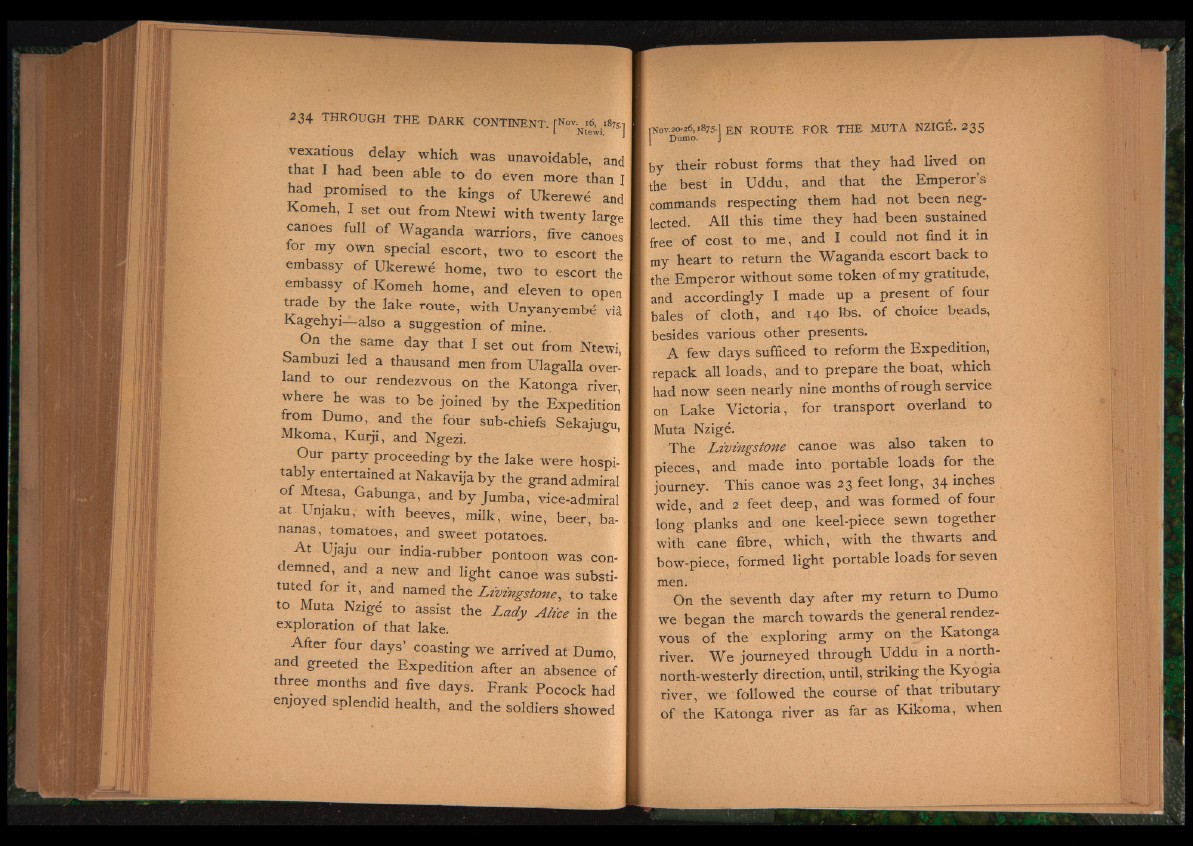
vexatious delay which was unavoidable, and
that I had been able to do even more than I
had promised to the kings o f Ukerewe and
Komeh, I set out from Ntewi with twenty large
canoes full o f Waganda warriors, five canoes
for my own special escort, two to escort the
embassy o f Ukerewe home, two to escort the
embassy of-Komeh home, and eleven to open
trade b y the lake route, with Unyanyembe via
K a g eh y i— also a suggestion o f mine..
On the same d ay that I set out from Ntewi,
Sambuzi led a thausand men from Ulagalla over- j
land to our rendezvous on the Katonga river,
where he was to be joined b y the Expedition
from Dumo, and the four sub-chiefs Sekajugu
Mkoma, Ku iji, and Ngezi.
Our p a rty proceeding b y the lake were hospi-
entertained at Nakavija b y the grand admiral
o f Mtesa, Gabunga, and b y Jumba, vice-admiral
at Unjaku, with beeves, milk, wine, beer, bananas,
tomatoes, and sweet potatoes.
A t Ujaju our india-rubber pontoon was condemned,
and a new and light canoe was substituted
for it, and named the L ivin g ston e, to take
to Muta Nzige to assist the Lady A lice in the
exploration o f that lake.
A fter four d ay s ’ coasting we arrived at Dumo,
an greeted the Expedition after an absence of
three months and five days. Frank Pocock had
enjoyed splendid health, and the soldiers showed I
rN0v.20-26.1875.] EN ROUTE f o r t h e m u t a n z ig e . 235
Dumo. J
by their robust forms that they had lived on
the best in Uddu, and that the Emperor’s
commands respecting them had not been neglected.
A ll this time they had been sustained
free o f cost to me, and I could not find it in
my heart to return the Waganda escort back to
the Emperor without some token o f my gratitude,
and accordingly I made up a present o f four
bales o f cloth, and 140 lbs. o f choice beads,
besides various other presents.
A few days sufficed to reform the Expedition,
repack all loads, and to prepare the boat, which
had now seen nearly nine months o f rough service
on Lake Victoria, for transport overland to
Muta Nzige.
The Livingstone canoe was also taken to
pieces, and made into portable loads for the
journey. This canoe was 23 feet long, 34 inches
wide, and 2 feet deep, and was formed o f four
long planks and one keel-piece sewn together
with cane fibre, which, with the thwarts and
bow-piece, formed light portable loads for seven
men.
On the seventh day after my return to Dumo
we began the march towards the general rendezvous
o f the exploring army on the Katonga
river. W e journeyed through Uddu in a north-
north-westerly direction, until, striking the K y o g ia
river, w e followed the course o f that tributary
o f the Katonga river as far as Kikoma, when